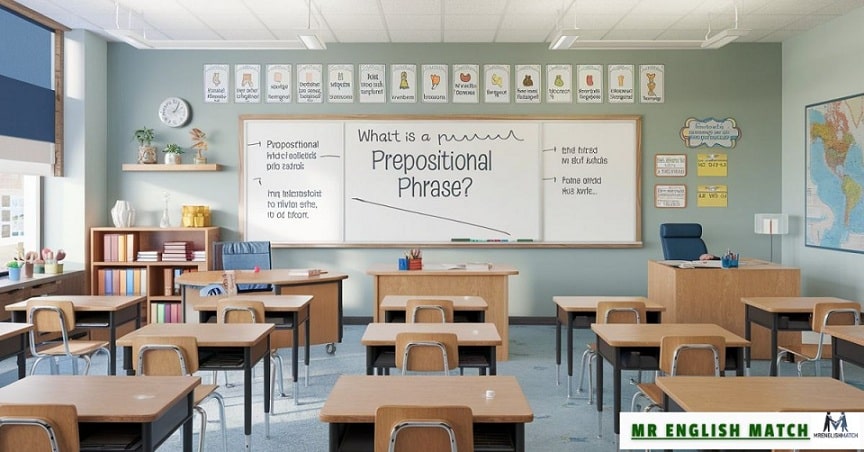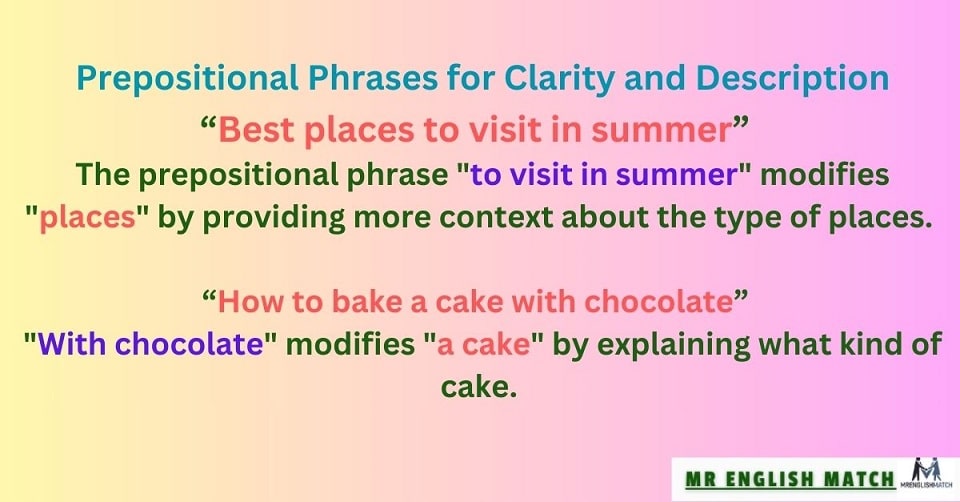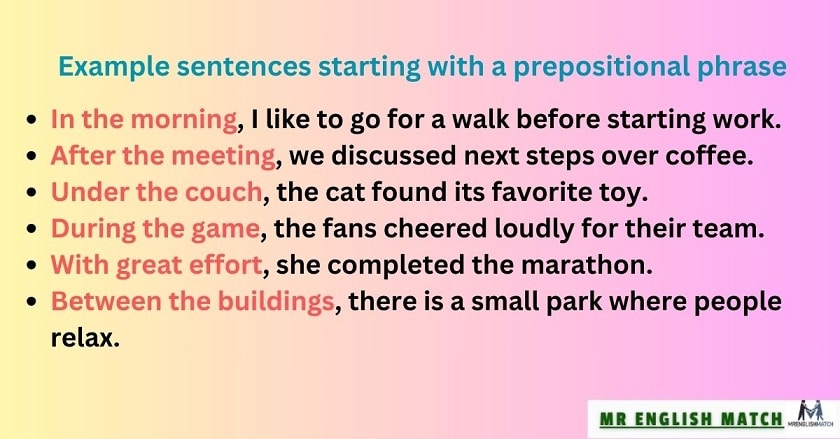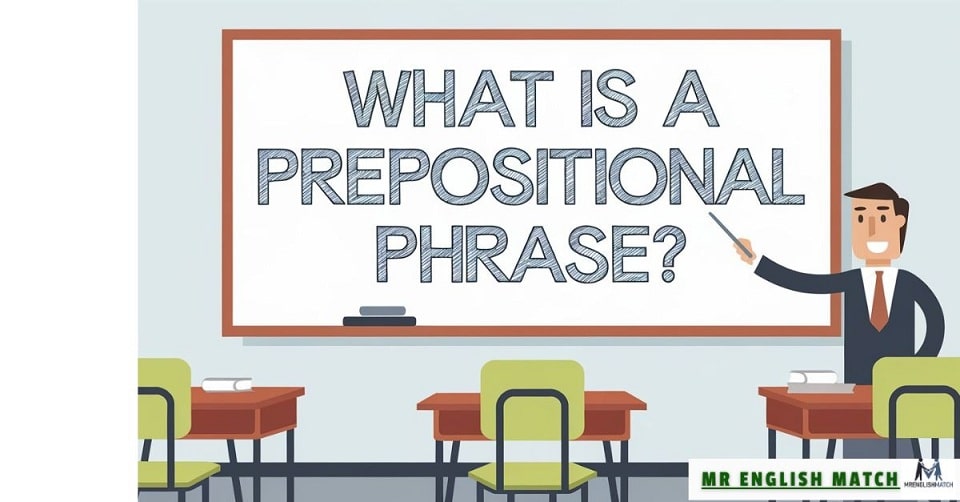What is a Phrase? To pick the idea of a prepositional phrase, it’s useful to start with phrases in general. A phrase is a group of words that acts as a single part of speech. It does not contain both a “subject” and a “verb“, making it different from a sentence. Phrases add detail and depth to your language. They allow writers to connect ideas, describe locations, and clarify time or manner.
What is a Prepositional Phrase?

A prepositional phrase consists of a preposition, its object, and any words that modify that object. The preposition itself shows relationships between the object and other parts of the sentence. Common prepositions include “in,” “on,” “under,” “before,” “with,” “by,” and “at.” The object can be a noun, pronoun, or even a gerund. Consider this prepositional phrase example: “in the park.” Here, “in” is the preposition, and “the park” is the object. The phrase gives us more information about location. A more detailed example might be: “He sat in the quiet park.” Here, “in the quiet park” modifies the verb “sat” by describing the location.
Prepositional Phrases for Clarity and Description

Prepositional phrases can modify nouns and verbs. When modifying a noun, they act as adjectives. For example, in “The book on the table is mine,” the phrase “on the table” describes which book. When a prepositional phrase modifies a verb, it acts as an adverb. Consider, “She walked through the forest.” The phrase “through the forest” explains where she walked. Another example of a prepositional phrase used in this way would be: “He spoke with great confidence.” This adds detail to how he spoke.
These phrases are valuable in writing because they enhance clarity. They give context and specify details that a sentence alone may lack. Teachers often focus on prepositional phrase examples for kids using sentence-building games create connect and live. By introducing phrases in a playful manner, children learn how to enrich their speech and writing, making it more expressive and accurate.
popular prepositional phrases
There’s a list of 10 popular prepositional phrases that modify nouns or verbs:
- “Best places to visit in summer” – The prepositional phrase “to visit in summer” modifies “places” by providing more context about the type of places.
- “How to bake a cake with chocolate” – “With chocolate” modifies “a cake” by explaining what kind of cake.
- “Tips for learning a new language” – The phrase “for learning a new language” gives clarity about the purpose of the tips.
- “Exercises for back pain relief” – “For back pain relief” explains what the exercises are intended for.
- “Top destinations in the USA” – “In the USA” clarifies which destinations are being referred to.
- “Ways to improve communication skills” – “To improve communication skills” shows the purpose of the ways being described.
- “Steps for starting a business” – “For starting a business” gives more detail about what the steps are for.
- “Places to visit near me” – The phrase “to visit near me” specifies the type of places being searched for.
- “Home remedies for cold and flu” – “For cold and flu” modifies “remedies,” indicating their intended use.
- “Recipes with low sugar” – “With low sugar” adds context about the type of recipes being searched for.
Read more about:
Adjective Phrase: A Guide for Everyday Use
Noun Phrases: A Comprehensive Guide
Practical Examples of Prepositional Phrases
Understanding prepositions can be practical too. For instance, if you need to use formula milk in a simple sentence, you might say, “I prepared a bottle with formula milk.” This prepositional phrase clarifies which thing used. Similarly, when describing time, a length of acquaintance example sentence could be: “After several years of friendship, they started working together.”
Prepositions are integral to common sayings and popular phrases we use daily. They bring life to our language, connect ideas, and enrich conversation. Whether you are writing a story, crafting a report, or helping kids learn language basics, and prepositional phrases examples unlocks new ways to connect, communicate, and express meaning.
common Prepositional Phrases (A-L)
There are two lists of preposition phrase ,20 examples of phrases
- About personal growth (Focuses on development topics like self-improvement and motivation)
- At home (Describes a location, often used in everyday conversation)
- At work (Refers to events or interactions taking place in the workplace)
- By the lake (Gives a specific location, often used to describe settings)
- During the meeting (Specifies timing for an event or discussion in professional settings)
- For effective meetings (Indicates purpose, often used in guides for improving workplace collaboration)
- For healthy eating (Clarifies the aim of diets or food recommendations)
- For remote teams (Describes practices or guidelines meant for virtual work environments)
- From the convenience store (Provides information about the origin of items or actions)
- In a month (Denotes a time period, often used for scheduling or setting goals)
- In the blink of an eye (Common phrase to show how fast something happens)
- In the city (Specifies a location, useful for travel or real estate descriptions)
- In the morning (Indicates a specific part of the day, often in daily routines)
- In the nick of time (Expresses precision or a narrow escape in timing)
- In the workplace (Refers to the professional environment and related topics)
- Near the airport (Shows proximity to a key location, often used for directions)
- On Main Street (Specifies a common street location in towns and cities)
- On the East Coast (Describes a geographical region in the USA)
- On time (Describes punctuality)
- Over the weekend (Refers to the period of Saturday and Sunday)
Most Searched Prepositional Phrases (M-Z)
- To improve communication skills (Denotes an action aimed at bettering workplace or personal communication)
- To manage projects (Highlights the purpose of tools or strategies in project management)
- To resolve conflicts (Indicates a goal, often discussed in conflict management strategies)
- To visit near me (Common search term for finding local attractions or places)
- To visit in summer (Refers to ideal destinations or activities during the summer season)
- Under the radar (Means something being unnoticed or without drawing attention)
- Use formula milk in a simple sentence (Instructional context often seen in learning and examples)
- With chocolate (Describes an ingredient or flavoring in recipes)
- With kids (Specifies an audience or participants, commonly used for activities and tips)
- With fervor (Describes doing something passionately or energetically)
- With great confidence (Expresses a manner of behavior, often used in speeches or presentations)
- Without gluten (Indicates dietary restrictions in food searches)
- Words that prepositional phrases start with (Describes the initial word choices that form prepositional phrases)
- Typical phrases (Refers to commonly used phrases in communication)
- Communication styles and modifiers in the workplace (Describes language styles and structures in professional settings)
- Length of acquaintance example sentence (Provides context for writing examples related to time and relationships)
- Prepositional phrases for kids (Focuses on teaching young learners about language and grammar)
- Sentence building games create connect and live (Engages children in interactive learning of sentence structure)
- Example sentence starting with a prepositional phrase (Provides illustrative examples of sentences using this structure)
- Popular phrases (Refers to widely used and recognized expressions in everyday language)
Example sentences starting with a prepositional phrase

To master prepositional phrases, it’s important to recognize their role in common phrases in English. They often form parts of common English phrases used every day, such as “at home,” “on time,” or “in the morning.” Prepositional phrases examples like these offer context and clarity. Typical phrases start with words such as “to,” “of,” “with,” “at,” and “for.” These words that prepositional phrases start with link ideas to show time, place, reason, or method.
For example, a typical phrase like “on vacation” can add detail to a sentence. “They met on vacation in Florida” tells us when and where they met. Writers can create engaging descriptions with example sentences starting with a prepositional phrase, such as, “In the blink of an eye, he disappeared.” The phrase adds emphasis and sets a vivid scene.
There’s a list of example sentences starting with a prepositional phrase highlighted, reflecting their role in common phrases and providing context:
- In the morning, I like to go for a walk before starting work.
- After the meeting, we discussed next steps over coffee.
- Under the couch, the cat found its favorite toy.
- During the game, the fans cheered loudly for their team.
- With great effort, she completed the marathon.
- Between the buildings, there is a small park where people relax.
- On top of the hill, you’ll find a beautiful view of the city.
- By the lake, we set up our picnic and enjoyed the sunset.
- Without hesitation, he volunteered to help with the project.
- In spite of the rain, we continued our outdoor adventure.
Prepositional Phrases in Communication and the Workplace
Prepositional phrases also play a big role in communication styles and modifiers in the workplace. Effective workplace communication often relies on specific, clear modifiers. Consider the phrase: “During the meeting, we discussed goals.” Here, “during the meeting” specifies when the discussion occurred. Using clear phrases helps professionals convey messages accurately and avoid misunderstandings. Overusing prepositional phrases, however, can lead to cluttered speech. By simplifying or using fewer prepositions, we can make our communication more effective.
In grammar lessons, we often teach children how to create prepositional phrases examples in sentences to strengthen their writing. Games and interactive exercises are often used to engage young learners, enhancing their understanding of language structure.
There are popular phrases with prepositional phrases highlighted, demonstrating their importance in communication and workplace contexts:
- “How to give feedback in the workplace” – “In the workplace” specifies the context where feedback is given.
- “Tips for effective meetings” – “For effective meetings” clarifies the purpose of the tips.
- “Common phrases used in emails” – “Used in emails” indicates where these phrases are typically seen.
- “Ways to resolve conflicts” – “To resolve conflicts” highlights the intended goal of the ways listed.
- “Improving collaboration among team members” – “Among team members” specifies who is involved in the collaboration.
- “Communication styles at work” – “At work” narrows down where these styles are applied.
- “Best practices for remote teams” – “For remote teams” shows the target audience for these practices.
- “Appropriate responses in meetings” – “In meetings” provides context for where responses are given.
- “Training modules on leadership” – “On leadership” indicates the subject of the training modules.
- “Tools to manage projects” – “To manage projects” clarifies the purpose of the tools.
FAQs
What is a prepositional phrase?
A prepositional phrase is a group of words that begins with a preposition and includes its object and any modifying words. It often provides additional details about where, when, or how something happens.
What are some common examples of prepositional phrases?
Some common prepositional phrase examples include:
- In the morning
- On the table
- At the park
- Under the bed
- For a reason
How do prepositional phrases function in sentences?
Prepositional phrases function by adding detail to sentences. They can modify nouns (acting as adjectives) or verbs (acting as adverbs), helping to describe time, place, direction, or reason.
What is an example of a prepositional phrase modifying a noun?
An example of a prepositional phrase modifying a noun is: “The book on the table is mine.” Here, “on the table” tells us which book is being referred to.
What is a prepositional phrase example modifying a verb?
In the sentence, “She ran across the field,” the phrase “across the field” tells us where she ran, modifying the verb “ran.”
How can prepositional phrases be used in business communication?
In business, prepositional phrases like “during the meeting,” “for the project,” or “in the report” can specify time, purpose, and location, enhancing clarity in communication.
What words do prepositional phrases start with?
Prepositional phrases typically start with words like to, at, on, in, under, by, for, with, about, and from.
Can prepositional phrases be used with kids for learning English?
Yes, prepositional phrases for kids can be used in sentence-building games to help children understand sentence structure and add more detail to their sentences in a fun way.
What is a typical sentence that starts with a prepositional phrase?
A typical sentence starting with a prepositional phrase is: “At the break of dawn, the birds begin to sing.”
How can I practice using prepositional phrases in daily use?
To practice, start by identifying common phrases in English that use prepositions. For example, “on time,” “at home,” or “by the door.” Try creating your own sentences using these phrases.
conclusion
prepositional phrases are essential elements of sentence structure, providing clarity and context by linking ideas in a detailed and specific way. Whether modifying nouns or verbs, they enrich communication by offering additional information about time, place, manner, and reason. Mastering the use of prepositional phrases is not only important for written communication but also enhances verbal skills, making both speech and writing more descriptive and engaging.
Understanding prepositional phrases for kids and adults alike is a valuable tool in any language learner’s toolkit. With practice, it becomes easier to incorporate them into everyday sentences, making communication more effective. Whether used in common phrases in English, business communication, or casual conversations, prepositional phrases help convey messages with precision and clarity.








